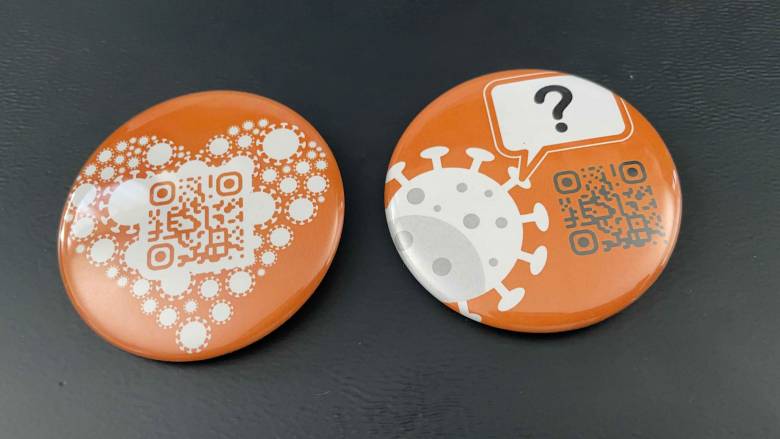
A creative new initiative involving OCAD University is aiming to increase vaccine confidence among health-care providers serving Toronto’s at-risk populations.
The Button Project allows health-care workers to wear a pin-button featuring a QR code that, when scanned, leads to a web page with answers to the top questions about COVID-19 vaccines, presented in a clear and simple way.
With this information on vaccine efficacy and safety easily at hand, they can have more productive dialogues with their health worker peers, and with their patients.
The buttons and FAQ list were designed and developed by OCAD U’s Health Design Studio, which is a partner in the project that is being led by emergency room physician Dr. Shobana Ananth.
Dr. Ananth came up with the idea after being redeployed to homeless shelters during the pandemic, and noticing relatively higher rates of vaccine hesitancy among her peers. The other project collaborators are the homelessness-focused health organization Inner City Health Associates and the anti-vaccine hesitancy coalition 19 to Zero.
“There is some evidence of higher vaccine uncertainty among health-care workers treating people in precarious situations…Also, often, health-care workers dealing with at-risk populations are hourly workers who may not have access to time off and other supports, and distrust vaccines for historic reasons,” says Dr. Kate Sellen, a Tier 2 Canada Research Chair in Health Design. “The buttons are a supportive tool for having conversations about vaccination.”
Sellen says the project responds to a strong need for COVID-19 vaccine public literature written in plain language with helpful visuals. That’s a distinct area of expertise for the Health Design Studio, which previously developed several one-page infographics on the coronavirus for hospital and clinic users through its award-winning Covid-19 Printables project.
With the support of some OCAD U graphic design students, Dr. Sellen developed two cartoon-style button designs of the COVID-19 virus, “to take away some of the fear it creates.”
With input from the partner groups, Dr. Sellen and her team developed 13 FAQs featuring straight-to-the-point answers on a variety of vaccine topics, such as whether the vaccine is safe, mask usage after getting vaccinated, side effects, and risks during pregnancy or breastfeeding. The information is accompanied by helpful icons originally created for the COVID-19 Printables project which were designed with input from community health workers.
The Button Project’s design will continue to be refined and updated according to feedback by Dr. Ananth as she continually evaluates its effectiveness in the city’s shelter system.
“This is about using the digital tools we have in a nimble way to address gaps in health information, and improve access to that information,” says Dr. Sellen.